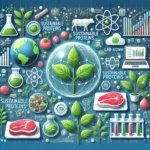
By Peter Zanatta
It was a pleasant Monday evening at Imperial College London when the air buzzed with excitement and the scent of a revolution in sustainable food systems. The Sustainable Protein Discussion and Reception promised to be a captivating blend of science and policy. This wasn’t just another academic soiree; it was a call to action for the future of food.
Stepping onto the podium, Henry B. Dimbleby, with the gravitas befitting his surname, laid down the stark reality: our current food systems are woefully unsustainable. Livestock alone accounts for a staggering one-third of greenhouse gas emissions, and so the purpose of the evening’s meeting, proteins – the potential saviours of our suffering planet. Dimbleby’s speech was matched only by the urgency of his message.
The evening’s highlight was Sir Andrew Steele of the Bezos Earth Fund’s announcement of a $30 million grant for Imperial College’s Sustainable Protein Research Centre. Sir Andrew assured us that this investment would turbocharge research into alternative proteins and propel them from the lab to our dinner plates. Steele’s speech was more than just a financial commitment; it was more a rallying cry for innovators and policymakers alike.
Dr Rodrigo Ledesma Amaro, a leading light of this new age of food, shared his insights into the cutting-edge research underway. Imperial College isn’t just tinkering at the edges; it’s at the vanguard of a shift in how we produce and consume protein. The audience journeyed through the latest developments in plant-based proteins, lab-grown meat, and even insect-based alternatives. Each innovation promises to mitigate environmental damage and provide nutritionally adequate and economically viable options.
Mr Dimbleby expounded on the broader implications of these advancements. He reminded us that livestock farming’s environmental footprint extends beyond greenhouse gases. It’s a leading cause of deforestation, biodiversity loss, and water pollution. Transitioning to sustainable proteins could alleviate these pressures and usher in a new era of ecological balance.
Yet, the road to widespread adoption of sustainable proteins has its bumps. One major hurdle is consumer acceptance. People are notoriously resistant to change, especially concerning what they eat. Improving these alternative proteins’ taste, texture, and affordability is crucial. Only then can they (we) make the leap from niche markets to mainstream dining tables.
Policy and government support, another cornerstone of the discussion, were emphasised as critical to enabling innovation. Effective legislation can create an environment where sustainable protein solutions can thrive, supported by subsidies, tax incentives, and research grants. Lobbying efforts, such as those suggested for the UK government’s transportation group, could be instrumental in driving these changes.
As the evening drew to a close, the sense of possibility was noticeable. This wasn’t just about reducing emissions or mitigating climate change. It was about reimagining our entire food system, creating a future where sustainability and food production go hand in hand.
For those keen to delve deeper into the revolution unfolding at Imperial College, the Sustainable Protein Research Centre’s website (https://www.imperial.ac.uk/a-z-research/sustainable-protein/) offers a treasure trove of information. Dr. Rodrigo Ledesma Amaro, a key architect of this movement, remains at the forefront of these ground breaking efforts.
The Sustainable Protein Discussion and Reception wasn’t just an event but a call to action. It showcased the advancements in sustainable protein research and the collaborative spirit required to bring these innovations to life. As we face the dual challenges of feeding a growing population and protecting our planet, the work being done at Imperial College stands as a beacon of hope and ingenuity.
www.attanzresearch.com



Review